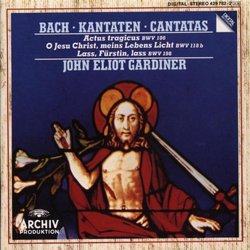| All Artists: John Eliot Gardiner, The English Baroque Soloists, The Monteverdi Choir, Stephen Varcoe, Michael Chance, Anthony Rolfe Johnson, Nancy Argenta, Johann Sebastian Bach Title: Cantats, Bwv.106, 118 & ,198 Members Wishing: 0 Total Copies: 0 Label: Polygram Records Original Release Date: 1/1/1991 Re-Release Date: 2/8/1991 Genre: Classical Styles: Opera & Classical Vocal, Historical Periods, Baroque (c.1600-1750) Number of Discs: 1 SwapaCD Credits: 1 UPC: 028942978225 |
Search - John Eliot Gardiner, The English Baroque Soloists, The Monteverdi Choir :: Cantats, Bwv.106, 118 & ,198
 | John Eliot Gardiner, The English Baroque Soloists, The Monteverdi Choir Cantats, Bwv.106, 118 & ,198 Genre: Classical
|
Larger Image |
CD Details |
CD ReviewsVoice teacher and early music fan George Peabody | Planet Earth | 02/11/2008 (5 out of 5 stars) "QUOTE FROM JOHN ELIOT GARDINER; 'I BELIEVE THAT THE CHURCH CANTATAS ARE THE VERY HEART OF BACH'S MUSIC.
Illness and death constantly disrupted the security of Bach's childhood and adulthood. We do not know when or for whom the "Actus Tragicus" BWV106 was written. Bach was in the habit of using compositional devices to illustrate theological points. In the central movement of BWV106 the earnest plea "Ja Komm Herr Jesu" (Come, Lord Jesus) is repeated more than 15 times, and the music demostrates the plea is not in vain. A spiritual longing for eternity with Christ emanates from the text and the music of the Motet "O Jesu Christ, mein lebens Licht" BWV118/231. The motet was given in 1736 at a Leipzig memorial service; we don't know for whom. Bach wrote the text and music of a mourning ode "Lass Fursten, lass noch einen Stahl" BWV198 for Christine Eberhardine, Electree of Saxony. It is an indication of the timeless quality of Bach's music that today these three works can inspire and comfort people of every creed and nation. John Eliot Gardiner has again produced a truly wondrous recording of Bach's music with his excellent Monteverdi Choir and a truly great group of soloists: Nancy Argenta (soprano)-Michael Chance (countertenor)-Rolfe Johnson (tenor) and Stephen Varcoe (bass). My favorite aria is sung by Chance and very magnificently :"In Deine Hande....)" (Into Thy Hands, I Commend My Spirit)." |

 Track Listings (15) - Disc #1
Track Listings (15) - Disc #1